
Prime Minister Pushpa Kamal Dahal lived in seclusion directing Nepal’s guerrilla war, but when his cadres laid down their arms and joined mainstream politics, he emerged from the jungle to lead the Himalayan republic.
Dahal, still widely known by his nickname Prachanda (“The Fierce One”), lost a confidence vote in parliament on Friday, which will see him step down as the country’s prime minister for a third time.
The civil war he launched in 1996 mobilized discontented Nepalese for his Maoist insurgency, calling for an end to centuries of feudal inequality, which ultimately left more than 17,000 people dead and thousands more missing today.
Dahal was able to claim victory when the conflict ended a decade later, following a peace deal that abolished Nepal’s monarchy and brought the Maoists into government.
“We believe the country has embraced the Maoists’ agenda,” he said in a 2022 interview with local broadcaster Kantipur.
Dahal was born in 1954 into an upper caste Hindu family, but grew up in the poverty of then-rural Nepal and spent his childhood herding goats and buffaloes.
Due to extreme hardships in his childhood, he developed an interest in leftist ideology and in 1980, at the age of 25, he joined the Communist Party.
He worked as a teacher but gradually became convinced that armed rebellion was the only way to bring radical change to one of the world’s poorest countries.
He was a mysterious figure during the war, anonymous to the public except for a wartime nickname, until he emerged to address his activists in 2006 as peace talks began.
Dahal led his party to an unexpected victory in elections two years later, but resigned nine months later amid a deadlock over efforts to integrate former Maoist fighters into the military.
He has since served twice more as prime minister, including another administration that lasted less than a year and his current term of just 18 months – both typical lengths of tenure under the constantly changing coalitions of Nepal’s parliament.
“Abandonment of the rank and file”
Dahal and his party colleagues credit the war with increasing the political representation of marginalised groups and improving their livelihoods.
He is considered a dynamic and charismatic leader due to his ability to maintain his position even in the tumultuous circumstances of Nepali politics.
However, critics say he is an opportunist who has formed alliances with various parties to pursue his personal interests.
Since joining Parliament, he has come under fire for his lavish lifestyle, especially after it emerged that he had rented a luxurious house in Kathmandu.
Many former guerrillas have left the party and accused Dahal and other leaders of betraying their sacrifices.
Two deputy leaders considered potential successors were also among those who resigned, helping Dahal consolidate power.
Critics also accused him of promoting a culture of nepotism in the party by promoting his daughters and relatives.
Aditya Adhikari, an author on the Maoist movement, said in 2016 that after the war, Dahal came to be seen as someone who was not just attracted by “money and power”.
“But even people outside the movement, who were rich and powerful, left the party activists and alienated its base.”
Dahal married his wife, Sita, when they were both teenagers and she accompanied him during the civil war, but little is publicly known about their life before the end of the conflict.
She died after a prolonged illness in 2023. The couple had four children, two of whom also died.
(Except for the headline, this story has not been edited by NDTV staff and is published from a syndicated feed.)

